- Home
- Scott Turow
KC09 - Identical Page 6
KC09 - Identical Read online
Page 6
She was so much happier than earlier in her life, when she’d felt like a handball ricocheting at high speed off walls she’d never seen coming. These days her main preoccupation, in the rare idle moment when she let her mind light there, was wondering how happy she had the right to be. No one could expect perfection.
She tended to deliver that admonition to herself at moments like this, when she was holding off the familiar combination of anger and humiliation that consumed her at the prospect that Heather Truveen, her girlfriend, would disappoint her again. It was Saturday night and Evon sat in the ballroom at the Kindle County Athletic Club, a gorgeous old room, with oaken pillars three stories high, that had been beautifully transformed for the wedding of Francine and Nella, the friends who had introduced Evon to Heather. The rows of stacking chairs had all been jacketed in white satin and an amphora full of white roses marked the spot on the riser where the ceremony would occur. Beside her, Evon had saved a seat on the aisle, knowing Heather would savor every detail of the brides’ attire. But any second, they would be stepping down the satin runner on the opposite arms of Nella’s dad. Evon had discreetly removed her BlackBerry from her handbag to see if Heather had sent any messages, when she finally arrived.
“Made it,” Heather whispered, and dropped her blonde head to Evon’s shoulder and nuzzled her for a second. Heather smelled surprisingly fresh, as her scent, Fracas, briefly surrounded Evon.
They had been together a year and a half now. Heather was thirty-eight, a creative executive at Coral Glotten—funny, a little wild, clever and very beautiful. She’d been a model to start, a tall elegant blonde whose grace reminded Evon of Merrel, who’d always been the most beautiful woman Evon knew and who Evon grew up longing to resemble. When Evon was eleven, Merrel gave her the Easter dress Merrel had made four years before. Her older sister curled Evon’s hair, and shortened the hem another inch just before church. ‘Doesn’t she look nice?’ Evon heard her sister ask their mother upstairs. ‘Nice as she can,’ her mother answered, ‘but she’ll never be much to write home about.’
One of the many good things that had happened when she was dispatched to Kindle County in 1992 was that she had to pretend to be the girl-on-the-side of the government’s rascally lawyer-informant and was obligated to look the part. Her hair was dyed to a brighter shade of blonde and sheared into the hedgehog style of the time, as if someone had taken a mower to one side of her head. She wore four-inch heels and lots of makeup every day, and stylish clothes, and discovered that she liked all of that far more than she’d ever let on to herself.
But no matter how big a lipstick lesbian she was, she’d never imagined being attractive to someone as glamorous as Heather. Beauty came to Heather in the same effortless manner in which Evon had excelled at sports. Heather was naturally fit, despite seldom working out, and never restricting what she ate. She was a true ash blonde—she boasted to Evon the first time they had dinner that the rugs matched the drapes—and was actually more beautiful with the swollen sleepy look she had in the morning.
And Heather was fun, carefree and blazingly funny. For the first several months, Evon found her endlessly amusing, even though Heather’s impulsiveness seldom took account of what Evon wanted. Awake in the middle of the night, Heather became entranced by an infomercial about Brazil and while Evon was asleep rebooked a vacation they’d planned for months. One evening, Heather walked into the apartment and waved her hands at the furniture she had spent months choosing. ‘This is all wrong,’ she said. ‘The sofa has to go.’ The sofa was crimson mohair and had been special-ordered at a cost of several thousand dollars. Evon nearly reeled at the waste, but was delighted at the same time to have exceeded the boundaries that had confined her all her life. When Heather returned to the store, she ordered a full second living room and asked them to hold it, awaiting the day she would change her mind again. Evon had roared when she heard.
But naturally the humor faded. Watching her girlfriend toss out an expensive top she’d worn only once, Evon retrieved it from the can. ‘Give it away, at least,’ she told Heather, who flicked a hand at the bother. With time, Evon began to see beneath the beautiful mask. Heather worked hard on the exterior because what was inside was often beyond her control. Black funks frequently gripped her and made her impossible and bearish. She drank too much, too often, and in that state was lacerating. And she was frustratingly fickle. Their plans had been to make a day out of getting ready for the wedding, go for spa treatments and mani-pedis. Instead, Heather slid out of bed at 8 a.m. and announced she had to work. Her principal client, Tom Craigmore, ever more demanding, wanted an all-day with his creative team for the line of athletic clothing he was going to launch in the fall.
“Where did you change?” Evon asked Heather now.
“The office.”
Heather had left the apartment without a bag, which meant her dress had been on a hanger at work and that she had known for some time their plans for today were doomed. Why not say something earlier, why put off being the source of disappointment? Heather was a baby that way. She’d come from a crazy messed-up home, a philandering father who’d killed himself eventually and a mother who’d never really touched the ground long enough to notice that her children were in distress. Heather as a result was afraid to face disapproval.
The ceremony began. It was a wedding with an asterisk. Francine and Nella had gone to Boston last weekend to be legally married. What was taking place here, in the presence of friends and family, was all that local law allowed, a religious commitment ceremony.
The officiant, an Episcopal priest who was a longtime friend to both women, blessed their union beautifully.
“Life,” he said at one point, “is much too cruel to go through it alone.” The remark pierced Evon like an arrow. Yes. That was true. She took Heather’s hand and squeezed it hard.
And on the power of that observation, it turned into a great night. A few years back, at the age of fortysomething, Evon had found out that she loved to dance. The music, especially the seventies tunes of her teens—“Stairway to Heaven,” Springsteen—liberated her as liquor or drugs did other people. Heather and she danced until they were a clammy mess, requesting four separate run-throughs of “Born To Run.” The club personnel shooed everybody out at 1 a.m.
By the time they arrived home, Heather was caught up in the inebriated fantasy of the wedding she would make. She had a thousand ideas: walking down an aisle lit by floating candles, in doubled crystal globes also containing orchids, the ceremony conducted on a mat of fresh lavender.
“And I want Cartier,” Heather announced. “My kisses do not begin with Kay, and if you come home with Zales, I don’t even know your name.” Heather was laughing when she said it, but there was a knife blade buried in her eyes.
When Heather left her to shower, Evon, who’d had far more to drink than usual, felt a stark mood shadow her heart. Heather’s talk of marriage, her regal demands, left Evon feeling how remote the chances were. Her doubts had little to do with her skepticism about whether same-sex marriage would ever be legal in this state, or even whether she had shed enough of a closeted person’s anxieties to be able to refer out loud to anyone as her “wife.” Something else concerned her, even if all the champagne made it impossible for her to be more precise. It was a shock to find herself dubious, because the story of the relationship had been that she pursued Heather, put up with her, forgave her. And it was true that she still craved Heather, loved her zany side and terrific sarcasm, and had touched something strong and good in herself by doting on her. In the past several months she’d realized she was basically Heather’s mother, which was not as bad a deal for Evon as putting it that way made it sound, because she enjoyed—no, relished—being a kinder, more patient and understanding person toward Heather than Evon’s mother had been to her. She wasn’t prepared yet to give any of that up.
But she was starting to lose faith in the myth or the legend or the fairy tale, whatever you called it, by which she�
��d been operating, the belief that Heather would ‘calm down,’ as Evon put it to herself, and love Evon as she wanted to be loved. Life was much too cruel to go through it alone. So she was here. And tomorrow when she awoke she’d believe it all again. But for now, the last glass of champagne had made her feel like a seer or an oracle who looked through the smoke called the future unable to make out any comforting shapes.
6.
Georgia—January 17, 2008
Tim saw the first of Hal’s ads about Paul and the murder Monday afternoon, when he put aside his book of myths and turned on the early news at 5 p.m. He’d given up on the local TV journalism years ago—it was all about Chihuahuas hunting lobsters, or Jesus appearing on a grilled cheese sandwich—but he was excited to find himself with a role in current events. At his age, he was accustomed to feeling irrelevant.
Paul’s lawsuit had made headlines for a couple of days, and now Hal was hitting back. Tim watched the commercial in amazement. A piece of paper that could have just as easily been obliterated by the seepage in his basement was now made to look like holy writ. The camera zoomed in sideways on the police report, then jumped first to the header that read “Greenwood County Sheriff’s Police,” then the date and finally “Paul Gianis” in the box for “Witness.” The words attributed to Paul blackened to boldface and then rose off the page, all while some unseen woman with a scolding voice asked if we wanted a liar for mayor. Tonight the commercial was shown again a minute later as part of the news. Tim turned away from the screen with a small turmoil in his gut. Not a word in the ad was untrue. But he still didn’t feel quite right about it.
Tim was reconsidering all of this as he looked between the little leaded darts of stained glass in his bayed front window, already bundled in his woolen overcoat and wearing a felt hat. The BMW pulled up to the curb and he locked up and lumbered out.
“All of four blocks,” he told Evon, putting on his seat belt, “but the newcomers don’t shovel their front walks. I’m too damn old for mountain climbing.” There had been a serious snow last week, the first in a couple of years. When Tim grew up here, it got to twenty below for days in the winter and snowed like hell whenever it warmed up. No more. Right after the flakes stopped falling, young Dorie Sherman across the street had been out with her little guy, showing him the drifts, which he’d never seen.
Evon asked for more detail on the woman they were going to see.
“Not a lot to say,” Tim answered. “Georgia Lazopoulos. Georgia Cleon now. Paul’s girlfriend back then. Her dad was the priest at St. D’s.”
“The Greek priests marry?”
“Orthodox, right. But only before they’re ordained. Sometimes makes for a slow course through the seminary.”
“Where I came from, the ministers’ kids were mostly crazy.”
“She was a nice girl, so far as I remember. Sincere. You read the report I sent?”
“I tried. But it was hard to make out much on the fax.”
“She talked her head off on the initial canvass. Said Dita and Paul seemed to have words the day she was killed. That’s the kind of stuff you wanted me to dig up, right?”
“Exactly. Did she tell the cop that because it seemed odd?”
“Not hardly. Cop said to tell him everything she remembered and she did, even how many pastries she ate. But I thought may as well talk to her. Given I’m billing hourly and trying to work off that retainer.”
Evon slapped his hand, and Tim laughed.
“Turn here,” he told her. Georgia was in the same little bungalow she’d bought with her ex-husband, Jimmy Cleon. Jimmy had been her rebound after Paul, glib and good-looking, but he’d been on drugs all along and she didn’t know it until the wedding silver disappeared, not much after the honeymoon. At least that was the story. Since Georgia was the priest’s daughter, everybody talked about her.
When her father had been pushed out at St. D’s, he’d lost the parish house and moved in with her. Father Nik had gone odd. Brain tumor, as Tim remembered. The surgery had saved him, but he was never quite the same, and he’d had a stroke by now, too. Georgia’s mom had passed while she was in high school, so it was just her and her loopy old dad, exactly the fate Tim was still hoping to save his daughters from, who were always on him to move out to Seattle where they were.
“Does she know I’m coming?” Evon asked when they parked. He’d motioned her into a space down the street, where they could maneuver over the black ruts driven into the snow. In this neighborhood, parking in the winter could be a perilous act. The city plows never got to these small streets and homeowners spent hours shoveling their spaces, protecting them with lawn chairs or those orange cones filched from road crews. The last fistfight Tim had gotten into, more than forty years ago, was when some joker pulled into his space as soon as he went to put away his shovel. But it was 3:30 and there was still a fair amount of parking here while most people were at work.
“Yeah. Said we were working for Hal. She didn’t sound pleased, but then again, she didn’t say no. Seemed to remember me.”
“Who could forget you?” Evon asked. “Tall, dark and handsome.”
He laughed. He was liking this Evon a good deal.
The woman who greeted them at the door was barely recognizable to Tim. Age had been unkind to her, had coarsened her skin and stolen the life from it, and like many of the girls in this neighborhood, she’d put on an awful lot of weight. She had been pretty, as Tim recalled, very pretty, and looking close you could see the remnants of that cheerful appealing face within a pudding of flesh. Maria had gotten pretty hefty, too, truth be told, not that he had ever thought much about that. In a long marriage, the present matters less, at least it did to him. Every day they’d been together was there in both of them, good days mostly. But he could only see Georgia as she was, and her appearance seemed to say she’d lost all connection with the girl she’d been. There was just this person who looked much shorter now, in a droopy shirt and leaving you to wonder what illusions made her put on stretch pants.
Tim reintroduced himself, mentioning neighbors he thought Georgia might recall, then asked how her father was doing. She made a face.
“You’ll see,” she said. “He wanders around here like he’s on a treasure hunt. My biggest problem is to keep him from picking up the phone. He gets on with these solicitors from like the Police Benevolent Fund and talks for an hour and promises them thousands. I finally just had to give him a pad of checks from a closed account. He loves to write checks. The big shot.”
She waved them into the dark living room. There were several beautiful icons on the wall, with their elongated flat look, and a lot of photos of Greece—the royal blue water and arid mountains—apparently taken on a family trip. Maria had wanted to go when the girls were young, but it was one more thing that got sucked under in the riptide after Katy’s death.
After his own wife died, Father Nik was overwhelmed by all the work of the parish and had needed Georgia to stay nearby. He hadn’t thought much of a girl going off to college anyway. She’d gotten a year of bookkeeping training and still worked in the headquarters of the big bank where she’d started at nineteen, which was now owned by an even bigger bank. She was the chief teller, counting other people’s money from 7 to 3 every day.
She brought them each a glass of water from the tap, then settled heavily on the print sofa. Evon sat beside her while Tim took an armchair. The TV was on and Georgia for a second couldn’t look away from some account of the latest goings-on with Britney Spears, who’d been hospitalized after locking herself in a room with her son.
“What a runny mess she’s turning into,” Georgia said, “and with everything she’s got.” She continued to gaze, enthralled. Her attitude was just like the Greeks with their gods, Tim decided, looking in on the life that was bigger than life, these grand figures whose triumphs were the stuff of dreams and whose hubris led to destruction so complete it made you happy to be living small. When the show went to commercial, Georgia clic
ked it off. But she pointed at the TV, an old walnut console, with the remote.
“I’ve been watching Hal’s ads,” she said, and her mouth soured. “I’m sure he sent you out here, thinking I’m the bitter old witch who’ll just crap on the guy who dumped her, but it’s not going to happen. I’ll tell you right now, I don’t believe Paul had anything to do with Dita’s murder.” The wide figure on the sofa tightened with these declarations, gripping her arms close to her body.
“Can’t say I’m surprised to hear that,” Tim answered. “You wouldn’t have spent all that time with somebody you figured for a murderer, right? But now and then people have another side nobody sees. Hal’s got his opinions and Paul decided to sue him for speaking his mind, so here we are. None of us was there when Dita was murdered. We just want to know what you remember. No desire for you to make anything up.”
Her brows were thick and she squinted at Tim a little, trying to figure out whether to believe him. He could see what had happened with her. Georgia was a little like a dog that had been beaten too much. She still had no idea what she’d done to bring all these troubles on herself, so she’d learned to distrust everyone.
“Well, I don’t really remember much after all this time,” Georgia said. “You know. The event stands out. How often are you with a girl and she turns up dead a few hours later, murdered no less? But who knows with the rest of it? What’s it been? Twenty-five years at least.”
“Of course,” said Tim. “But memory can be funny. Sometimes you can say to a gal, just an example, but years later, do you remember what dress you were wearing that day? And they do.”

 Testimony
Testimony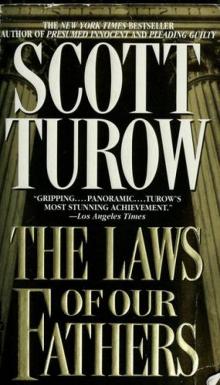 The Laws of Our Fathers
The Laws of Our Fathers Ordinary Heroes
Ordinary Heroes Personal Injuries
Personal Injuries Limitations
Limitations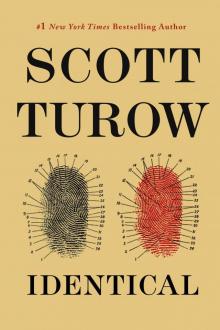 Identical
Identical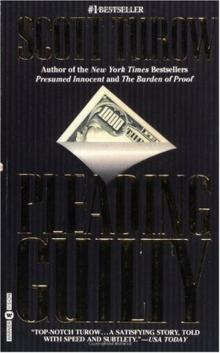 Pleading Guilty
Pleading Guilty Presumed Innocent
Presumed Innocent Reversible Errors
Reversible Errors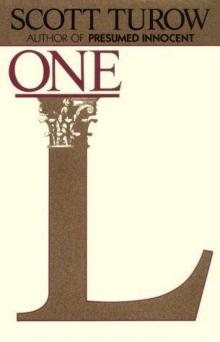 One L: The Turbulent True Story of a First Year at Harvard Law School
One L: The Turbulent True Story of a First Year at Harvard Law School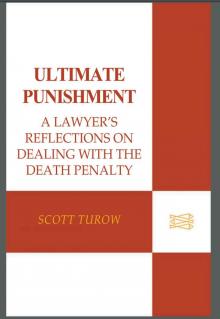 Ultimate Punishment
Ultimate Punishment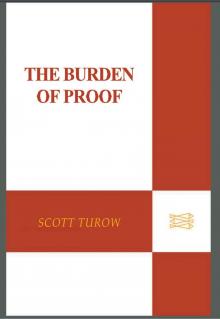 The Burden of Proof
The Burden of Proof Ordinary Heroes (2005)
Ordinary Heroes (2005)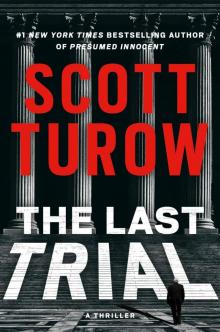 The Last Trial
The Last Trial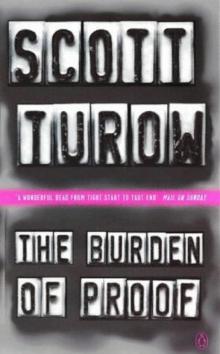 The Burden of Proof kc-2
The Burden of Proof kc-2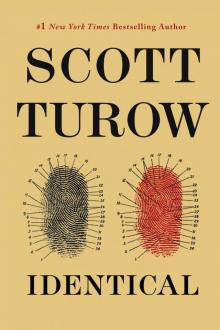 KC09 - Identical
KC09 - Identical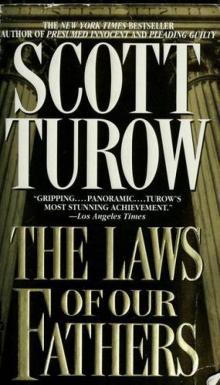 The Laws of our Fathers kc-4
The Laws of our Fathers kc-4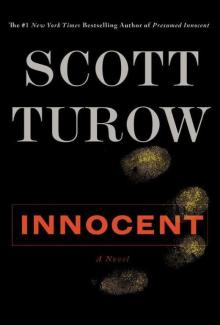 Innocent kc-8
Innocent kc-8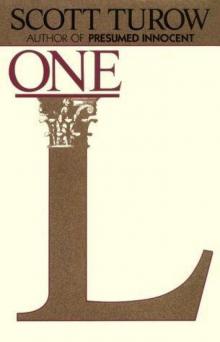 One L
One L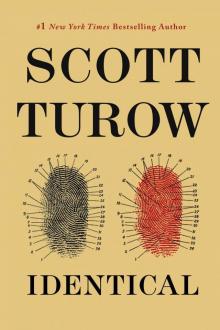 Identical kc-9
Identical kc-9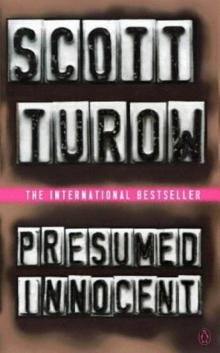 Presumed innocent kc-1
Presumed innocent kc-1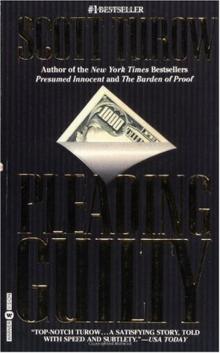 Pleading Guilty kc-3
Pleading Guilty kc-3 One L (1977)
One L (1977)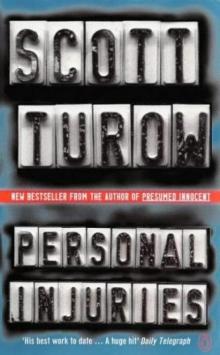 Personal injuries kc-5
Personal injuries kc-5